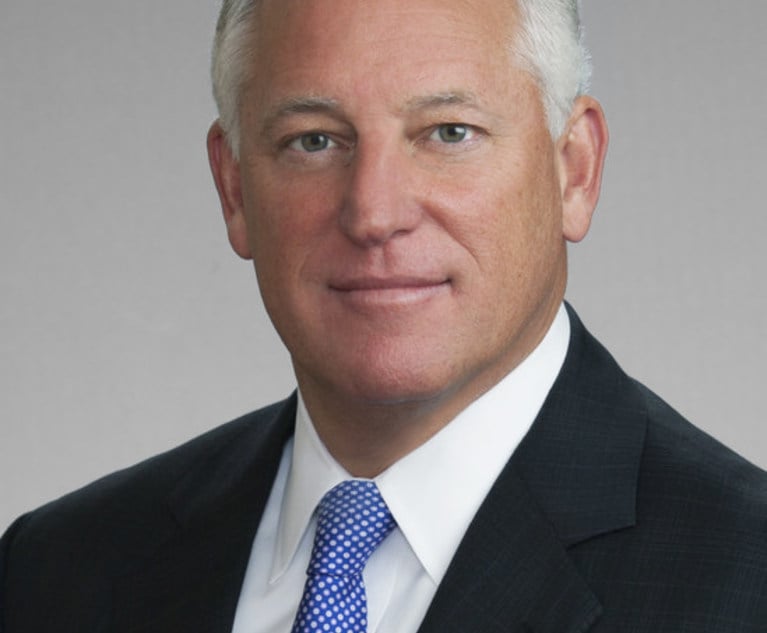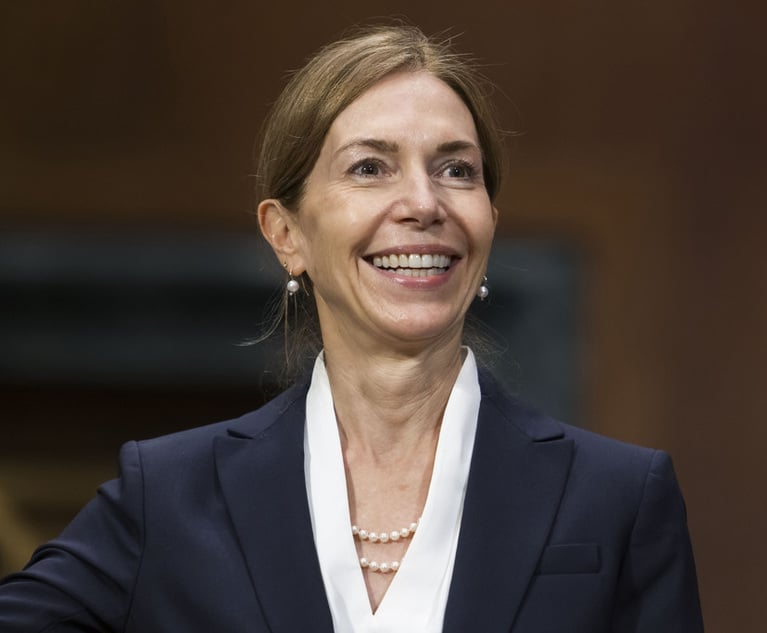 Supplies on a check-in desk at Safer Inside, a realistic model of a safe injection site in San Francisco. California. AP Photo/Eric Risberg, File
Supplies on a check-in desk at Safer Inside, a realistic model of a safe injection site in San Francisco. California. AP Photo/Eric Risberg, FileNovel Legal Fights Loom as Nation's First Safe Injection Site Gains Court Approval
Attorneys say the nonprofit group seeking to run the site might still have a long road of litigation ahead—one that could be paved with first-impression issues.
February 26, 2020 at 06:37 PM
7 minute read
The original version of this story was published on The Legal Intelligencer
The Philadelphia nonprofit looking to establish the nation's first safe injection site got final approval to open its doors from a federal court in Pennsylvania on Tuesday, but, according to attorneys, the group might still have a long road of litigation ahead—one that could be paved with first-impression issues.
U.S. District Judge Gerald McHugh of the Eastern District of Pennsylvania ruled Tuesday that nothing in the nonprofit's proposal to open a facility where medical staff would oversee heroin injections would violate federal law. The ruling came five months after the judge rejected arguments by federal prosecutors that the harm reduction site, proposed by the nonprofit Safehouse, would violate a portion of the Controlled Substances Act colloquially known as the "crack house" statute.
U.S. Attorney William McSwain of the Eastern District of Pennsylvania has argued that the proposed site, which would include a "consumption room" where medical staff would oversee heroin injections, would violate the law, but in his seven-page ruling McHugh said prosecutors' arguments "overlook[ed] the complexity of determining the proper application of the law."
"Safehouse does not hide that illegal substances will be used on its premises," McHugh said. "To the government, that alone is enough to resolve the statutory question. But that position depends upon an overly simplistic formulation of 'purpose,' one that it struggled to defend at oral argument."
In the wake of the ruling, Safehouse announced its plans to operate the site inside a medical facility in South Philadelphia beginning the following week. McSwain, on the other hand, vowed to appeal.
"We respectfully disagree with the district court's ruling and plan to appeal immediately," McSwain said in a statement issued late Tuesday. "What Safehouse proposes is a radical experiment that would invite thousands of people onto its property for the purpose of injecting illegal drugs. In our view, this would plainly violate the law and we look forward to presenting our case to the U.S. Court of Appeals for the Third Circuit."
His office filed a notice of appeal in the district court late Wednesday.
DLA Piper attorney Ilana Eisenstein, who represented Safehouse, said in a statement that the group is also looking forward to "defending Judge McHugh's thoughtful and well-reasoned decision on appeal."
"We are gratified to have a final judgment that confirms that Safehouse's lifesaving overdose prevention services do not violate federal law," Eisenstein said in the statement. "This judgment provides the path forward for Safehouse to open and to begin offering medically supervised consumption, which is urgently needed in the opioid crisis now facing Philadelphia and this country."
Eisenstein also said she is not expecting any litigation outside the federal appeals process, but other attorneys in Philadelphia see things differently, and several said Pennsylvania courts are likely to see litigation beyond the single dispute now headed for the Third Circuit.
Philadelphia attorney A. Charles Peruto Jr. said he has already fielded one request to file a lawsuit over the proposed site. Those claims, he said, would focus on due process issues about the way the location of the site was selected.
Safehouse unveiled the details of its proposal at a press conference Wednesday, saying it planned to house the site in the Constitution Health Plaza at the intersection of Broad and McKean streets. The proposal garnered vocal backlash at the press conference from local residents, as well as City Councilmember Mark Squilla, whose district abuts the health care center. Squilla and others said the location was a surprise to community leaders and the decision was made without any local input.
According to Peruto, those who came to him looking to sue wanted to pursue claims alleging their property, that is to say the value of their homes, had been taken without proper due process.
"By building this safe injection site, the value of their homes will plummet, and they did not have an option to be heard at a hearing," he said.
Peruto, who voiced several criticisms of the proposed site, said he did not choose to pursue the due process claims, though, since his focus is on criminal defense. However, he said he did refer the case out to other lawyers who focus more on civil litigation.
A due process lawsuit is one form of so-called "NIMBY" or, "Not in My Back Yard"-inspired lawsuits the site may face, but attorneys said opponents to the plan could potentially also raise zoning and licensing challenges.
Blank Rome attorney Peter Kelsen, who focuses on real estate litigation, said that, while any zoning challenges will be dependent on the specific zoning and use permits that might be required to operate the facility, suits could challenge whether allowing people to use heroin at the facility constitutes a "permitted use" in a zoning context.
"We have gotten approval dozens of times for in-patient recovery and residential recovery facilities within properties zoned as hospitals, or health care institutions saying that use of substance recovery is in fact a permitted use in a hospital context," he said, adding that the issues might not be as clear cut when it comes to supervised injection sites. "I don't think you're going to find anything in case law that deals with safe injection sites and zoning. … It's such a unique category."
While oftentimes the city would be a leading voice in pursuing a zoning challenge, he said, local residents and registered neighborhood associations would also have standing to bring claims, which would be more likely when it comes to the safe injection site, as Philadelphia Mayor Jim Kenney has been vocally supportive of the site.
Kelsen said that, given how there are other harm reduction sites being proposed in Philadelphia and beyond, both sides might be interested in having guidance on what appears to be a first-impression issue.
"These controversial issues … always make for the nastiest zoning fights," he said.
Another area of law that could also see a host of novel disputes over the site could be in the professional licensing arena.
According to Philadelphia attorney Brian Quinn, who handles professional licensing defense, despite McHugh's ruling, there could be other federal or state laws those directly overseeing the injections could arguably be violating.
"This would obviously be first impression," he said. "If you're a person who's licensed, you've got to consider that before taking this job."
The project, he said, raised questions about what advice the nonprofit would give to potential employees, and what protections it will provide if licensing issues arise down the line. And even if there are no direct licensing issues for those operating the consumption room, Quinn said, some ancillary concerns might arise, including whether those operators would have a duty to report to the state licensing board if they recognize a fellow licensed nurse or doctor using in the consumption room.
Although some of these potential legal disputes might be a long way off, with Safehouse pushing to open its facility next week, attorneys expect some of these possible challenges could be making their way into Pennsylvania courthouses soon.
This content has been archived. It is available through our partners, LexisNexis® and Bloomberg Law.
To view this content, please continue to their sites.
Not a Lexis Subscriber?
Subscribe Now
Not a Bloomberg Law Subscriber?
Subscribe Now
NOT FOR REPRINT
© 2024 ALM Global, LLC, All Rights Reserved. Request academic re-use from www.copyright.com. All other uses, submit a request to [email protected]. For more information visit Asset & Logo Licensing.
You Might Like
View All
Phila. Med Mal Lawyers In for Busy Year as Court Adjusts for Filing Boom
3 minute read
In Talc Bankruptcy, Andy Birchfield Skipped His Deposition. Could He Face Sanctions?
6 minute read
Health Care Giants Sue FTC, Allege Lina Khan Using Loaded Process to Vilify Pharmacy Benefit Managers
3 minute readLaw Firms Mentioned
Trending Stories
- 1Gibson Dunn Sued By Crypto Client After Lateral Hire Causes Conflict of Interest
- 2Trump's Solicitor General Expected to 'Flip' Prelogar's Positions at Supreme Court
- 3Pharmacy Lawyers See Promise in NY Regulator's Curbs on PBM Industry
- 4Outgoing USPTO Director Kathi Vidal: ‘We All Want the Country to Be in a Better Place’
- 5Supreme Court Will Review Constitutionality Of FCC's Universal Service Fund
Who Got The Work
Michael G. Bongiorno, Andrew Scott Dulberg and Elizabeth E. Driscoll from Wilmer Cutler Pickering Hale and Dorr have stepped in to represent Symbotic Inc., an A.I.-enabled technology platform that focuses on increasing supply chain efficiency, and other defendants in a pending shareholder derivative lawsuit. The case, filed Oct. 2 in Massachusetts District Court by the Brown Law Firm on behalf of Stephen Austen, accuses certain officers and directors of misleading investors in regard to Symbotic's potential for margin growth by failing to disclose that the company was not equipped to timely deploy its systems or manage expenses through project delays. The case, assigned to U.S. District Judge Nathaniel M. Gorton, is 1:24-cv-12522, Austen v. Cohen et al.
Who Got The Work
Edmund Polubinski and Marie Killmond of Davis Polk & Wardwell have entered appearances for data platform software development company MongoDB and other defendants in a pending shareholder derivative lawsuit. The action, filed Oct. 7 in New York Southern District Court by the Brown Law Firm, accuses the company's directors and/or officers of falsely expressing confidence in the company’s restructuring of its sales incentive plan and downplaying the severity of decreases in its upfront commitments. The case is 1:24-cv-07594, Roy v. Ittycheria et al.
Who Got The Work
Amy O. Bruchs and Kurt F. Ellison of Michael Best & Friedrich have entered appearances for Epic Systems Corp. in a pending employment discrimination lawsuit. The suit was filed Sept. 7 in Wisconsin Western District Court by Levine Eisberner LLC and Siri & Glimstad on behalf of a project manager who claims that he was wrongfully terminated after applying for a religious exemption to the defendant's COVID-19 vaccine mandate. The case, assigned to U.S. Magistrate Judge Anita Marie Boor, is 3:24-cv-00630, Secker, Nathan v. Epic Systems Corporation.
Who Got The Work
David X. Sullivan, Thomas J. Finn and Gregory A. Hall from McCarter & English have entered appearances for Sunrun Installation Services in a pending civil rights lawsuit. The complaint was filed Sept. 4 in Connecticut District Court by attorney Robert M. Berke on behalf of former employee George Edward Steins, who was arrested and charged with employing an unregistered home improvement salesperson. The complaint alleges that had Sunrun informed the Connecticut Department of Consumer Protection that the plaintiff's employment had ended in 2017 and that he no longer held Sunrun's home improvement contractor license, he would not have been hit with charges, which were dismissed in May 2024. The case, assigned to U.S. District Judge Jeffrey A. Meyer, is 3:24-cv-01423, Steins v. Sunrun, Inc. et al.
Who Got The Work
Greenberg Traurig shareholder Joshua L. Raskin has entered an appearance for boohoo.com UK Ltd. in a pending patent infringement lawsuit. The suit, filed Sept. 3 in Texas Eastern District Court by Rozier Hardt McDonough on behalf of Alto Dynamics, asserts five patents related to an online shopping platform. The case, assigned to U.S. District Judge Rodney Gilstrap, is 2:24-cv-00719, Alto Dynamics, LLC v. boohoo.com UK Limited.
Featured Firms
Law Offices of Gary Martin Hays & Associates, P.C.
(470) 294-1674
Law Offices of Mark E. Salomone
(857) 444-6468
Smith & Hassler
(713) 739-1250









